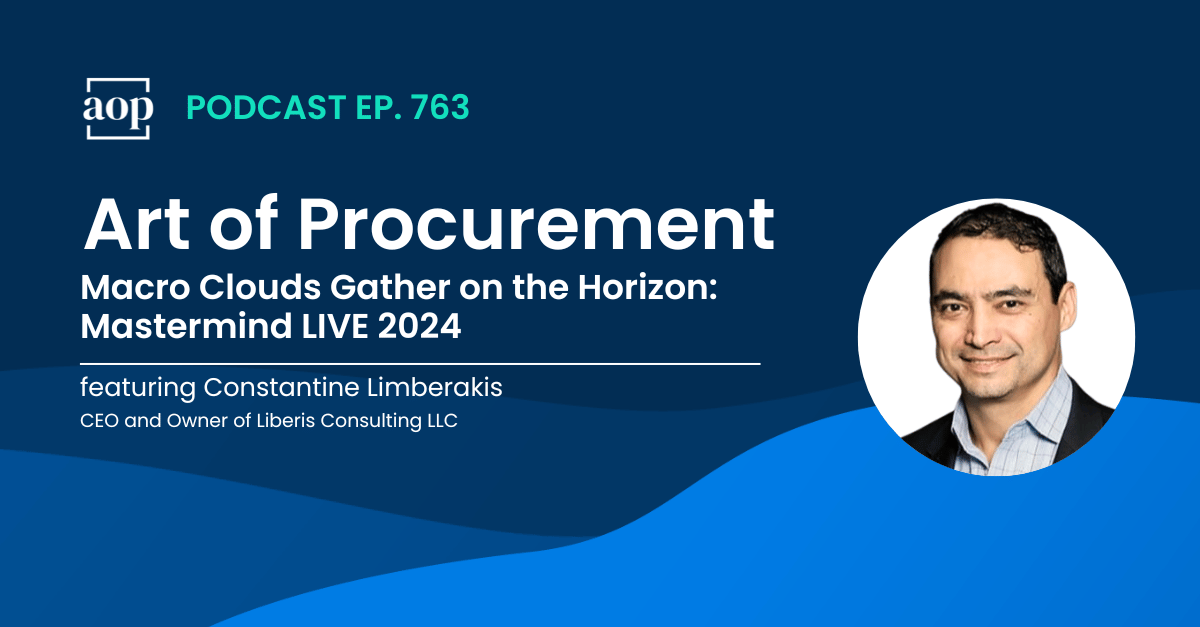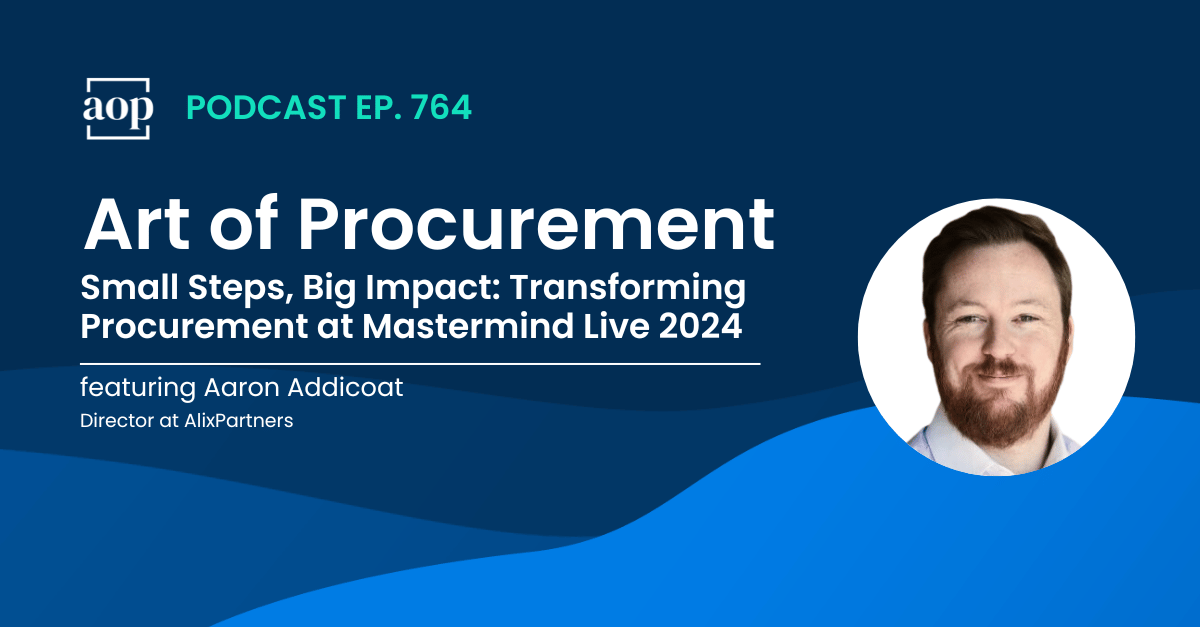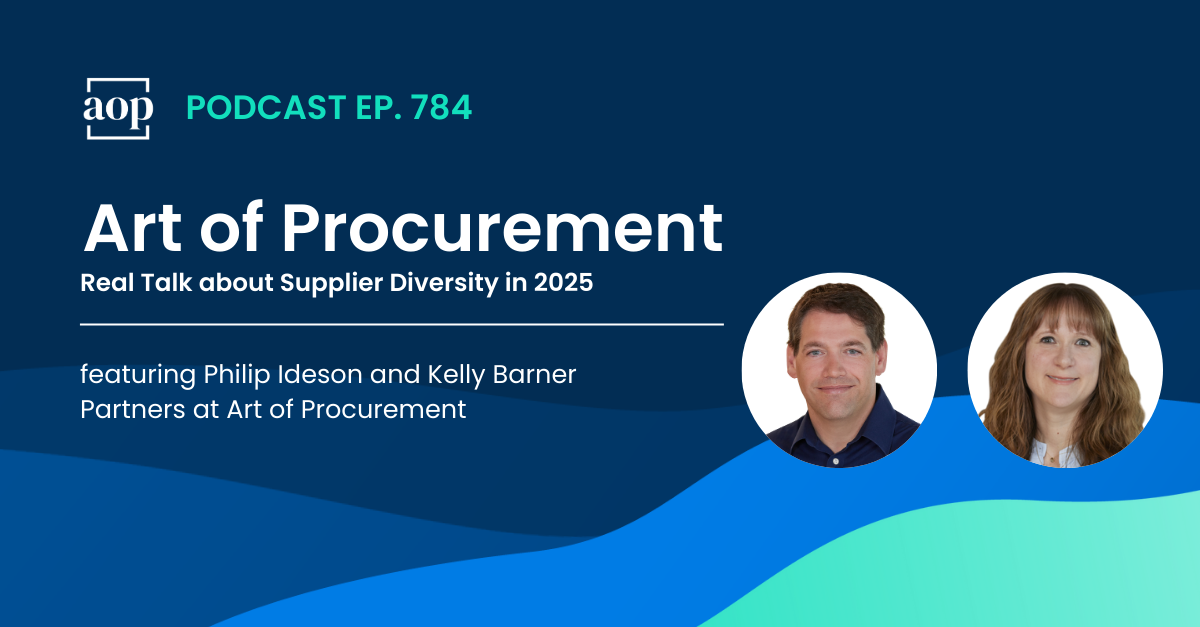4 min read
Macro Clouds Gather on the Horizon: Mastermind LIVE 2024
Philip Ideson : December 22, 2024

“I think there's this dichotomy of two things that we always have to keep in mind in procurement. We don't want to create friction. We want frictionless procurement. At the same time, we want to be seen as the people who have ideas, who could come up with something that could be innovative and have influence in the business.”
Constantine Limberakis, CEO and Owner of Liberis Consulting LLC
The recent U.S. election. Increasing global sustainability mandates. The rise of de-globalization. Changes to the workforce in the face of technology advancements.
As per usual, the hurdles procurement has to jump over are only ramping up. As procurement organizations weigh all these factors and aim to figure out their vision for the next 12, 18, and 24 months, we’re all leaning on each other to work out the best strategies.
Procurement professionals from across the world gathered for AOP Mastermind LIVE 2024, a virtual event where speakers share their insights and advice for succeeding in the coming year. In one session, Kelly Barner sat down with Constantine Limberakis, CEO and Owner of Liberis Consulting LLC, to discuss macroeconomic concerns and trends that procurement will certainly need to keep an eye on in the coming years.
For more than 20 years, Constantine has played strategic roles in a wide spectrum of B2B organizations in analyst advisory, consulting, product marketing, product development, and market research capacities. His Master’s Degree in public and international affairs gives him a unique perspective on the global trends that procurement must adapt to.
During their discussion, Kelly and Constantine tackled the biggest of the big topics—effective inflation, the future of work, de-globalization, and regulation—and offered session attendees, and now you, as a listener, a lot to consider.
Here are a few highlights:
Inflation has Changed the Paradigm
Inflation is nothing new, but the rate at which we saw rates rise is. Constantine pointed out, “We were used to seeing inflation rates that were in the single digits, low ones or twos.” However, everyone panicked as rates in the post-COVID environment shot through the roof.
“Navigating that space now requires a new mindset, with procurement teams needing to consider what parts of the inflationary environment they must pay closer attention to. As rates go down a bit, “It goes back to understanding your business and knowing where those rates are going to have that permanence. Are you looking at different models across where you think you could decrease costs or [tighten inventory]?”
Mentioning how procurement uses technology to enable some of those tactics, the conversation turned to workforce trends.
Technology Lets Procurement Influence the Business
Many people are concerned that AI is going to take their jobs, but if you ask Constantine, it’s more a matter of figuring out how to leverage AI and other technology to balance labor-intensive versus non-labor-intensive work.
Human teams can use AI to quickly get the data they need to understand wider macro trends—where we are as an economy, what forces are driving us, and how we need to adapt our workforce to rise to challenges.
In looking at procurement’s adoption of digital technology, Kelly pointed out the chance to move from reactive adoption to proactive. “Whether it's an operating model or a business objective that we're trying to help satisfy, [there’s an opportunity to] look at what we currently have in-house and say, ‘You know what we actually think would really be a differentiator?’”
Constantine agreed, saying, “I think there's this dichotomy of two things that we always have to keep in mind in procurement. We don't want to create friction. We want frictionless procurement. At the same time, we want to be seen as the people who have ideas that could come up with something that could be innovative that could have influence in the business.
We have to continue saying, ‘We want to be innovators, and we want to be different. Let’s look at what other parts of the business need and how they need that from us.”
The discussion then dipped into a topic Kelly had been itching to talk about all day.
De-Globilization Will Allow Procurement to Shine
The list of reasons countries are bringing their supply chains closer to home is a long one. The cost of labor has risen in top manufacturing countries like China. Political elements and a rise in nationalism have left countries feeling exposed and tightening their relationships with trade partners.
Most people will see general news stories about de-globalization, get worked up, and want to make immediate business decisions that won’t actually benefit the business. Procurement? They step in with rational, data-driven thinking.
Kelly spoke proudly of our industry’s reaction to these situations. “Some of the procurement skills, whether it's the analytical stuff, the risk mitigation stuff, the supplier prequalification, it's like, ‘Procurement has an answer for that.’ We've been doing that forever. Let's not make an emotional decision. Let's run some numbers. Let's research some companies. Let's figure out if this is a good decision.”
The topic of de-globalization brought Kelly and Constantine to the final “big one” of the session.
Regulation is Always Going to Be Here
As increasing sustainability mandates and laws related to forced labor come into play, procurement may sometimes wonder: are regulations anti-country, or are they really meant to improve what’s going on in supply chains? Either way, regulation has and will always be here in some capacity.
While it can feel difficult to manage, procurement needs to figure out which regulations impact them and be strategic in addressing them now to protect themselves in the future. It’s also important to consider how regulations will change as new elections happen and new legislation is passed as well as the impacts that will play out over the next several years.
Kelly ended the session on an inspirational note. “Feel the spirit of the moment, figure out what needs to be done now, and be thinking five years out.”
Catch everything Kelly and Constantine shared during the session. Listen to the full recap here.
Subscribe to Art of Procurement
Apple | Stitcher | iHeart Radio | Email
Links & Resources
- Constantine Limberakis on LinkedIn
- Watch on demand: Mastermind LIVE 2024
- Subscribe to This Week in Procurement
- Subscribe to Art of Procurement on YouTube




